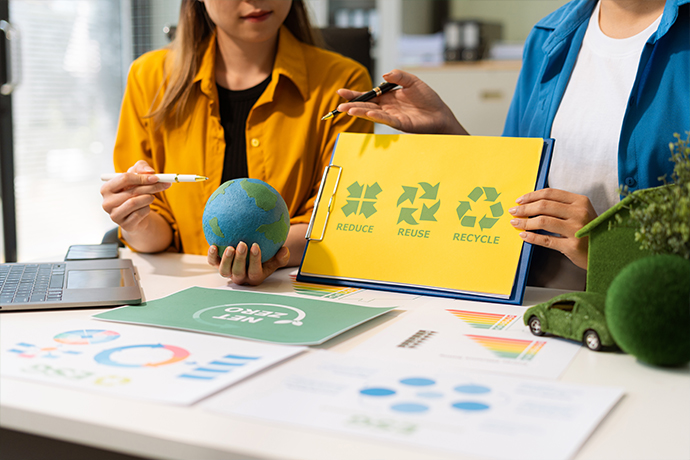 SPEAKERS
SPEAKERS
 TOPICS
TOPICS
Explore 7 sustainable business strategies that are shaping the future, driving innovation, and promoting eco-friendly practices for long-term growth and success.

In today’s interconnected and environmentally conscious world, sustainability no longer stands as a mere option—it becomes a necessity. As climate change, resource scarcity, and social inequality become more pressing, businesses across all sectors respond by adopting more responsible and future-focused practices. A sustainable business strategy not only addresses environmental and social challenges but also ensures long-term profitability, operational resilience, and continued relevance.
This article explores seven real-world sustainable business strategy examples that are shaping the future of commerce. Whether you’re part of a start-up or a multinational corporation, these insights may serve as inspiration to reframe your own corporate sustainability strategy.
Patagonia consistently emerges as a leading example of a sustainable business. The outdoor clothing brand centres its operations around environmental preservation. From using recycled and organically grown materials to encouraging customers to repair rather than replace products, Patagonia embeds sustainability at the heart of its business model.
Their transparent supply chain, fair labour practices, and dedication to activism—like donating a percentage of profits to grassroots environmental groups—reinforce how a strong business sustainability strategy can also build customer trust, foster loyalty, and generate long-term goodwill.
Importantly, Patagonia also influences industry peers through its “1% for the Planet” initiative, encouraging other businesses to donate a portion of their revenues to environmental causes. This ripple effect demonstrates how a single company can drive collective action across sectors.
Unilever proves that large-scale impact is possible through holistic integration. Rather than treating sustainability as a separate initiative, the company embeds it into every brand under its global umbrella. Its Sustainable Living Plan focuses on reducing environmental footprint, improving health and wellbeing, and enhancing livelihoods.
Unilever has reduced water usage in its manufacturing, cut plastic waste through packaging redesigns, and embraced renewable energy across many of its facilities. By working with suppliers, customers, and local communities, Unilever’s corporate sustainability strategy creates systemic change.
Their approach shows that when sustainability becomes part of business DNA—rather than an afterthought—it drives innovation, improves stakeholder relationships, and boosts long-term profitability.
IKEA continues to evolve with sustainability in mind. Their goal to become fully circular and climate-positive by 2030 reflects a deep commitment to long-term environmental responsibility. This includes reselling used furniture through buy-back schemes, designing products for disassembly and reuse, and investing heavily in renewable energy and sustainable forestry.
The company’s innovative efforts, such as flat-pack design to minimise transport emissions and encouraging DIY repairs, show how traditional retailers can adopt forward-thinking sustainable business practices while still maintaining affordability and accessibility for millions of customers.
IKEA also collaborates with researchers and NGOs to improve product life cycles and promote sustainable living in everyday households. This community-focused approach adds a human dimension to their business strategy.
The Body Shop has long stood for more than skincare. With fair trade programmes, cruelty-free testing, and community-led initiatives, the brand remains a committed advocate for ethical sourcing and empowerment.
Their business sustainability strategy involves creating lasting partnerships with producers from marginalised communities, ensuring their operations support human rights and economic inclusion alongside environmental goals.
Furthermore, the brand’s packaging innovations, such as refill stations and return schemes, reduce waste while engaging customers directly in the sustainability process. By making ethics a core part of its identity, The Body Shop cultivates a purpose-driven brand that resonates deeply with conscious consumers.
Innocent Drinks approaches sustainability with a blend of creativity and responsibility. From 100% recyclable packaging and responsible ingredient sourcing to carbon-neutral production goals, the brand sets an accessible example for small and medium-sized businesses.
As part of their wider marketing strategy sustainability efforts, Innocent also engages consumers through clear labelling, honest storytelling, and awareness campaigns. This transparency builds trust and positions the company as a relatable and responsible brand.
They further commit to social responsibility by funding local initiatives, supporting food charities, and encouraging ethical business culture within their workforce. Innocent shows that even smaller players can make a measurable difference.
While not the first brand you associate with green practices, Google leads the tech world in sustainability. The company has operated on 100% renewable energy since 2017 and continues to invest in solar, wind, and geothermal projects. Moreover, it uses its advanced AI capabilities to help other organisations and governments reduce their carbon footprint.
For instance, Google Maps now shows eco-friendly routes, and its cloud services use energy-efficient infrastructure. These initiatives illustrate how a well-integrated sustainable business strategy can generate both environmental and economic benefits across industries.
Google also funds sustainability research and supports global green policy development. Their example shows how the intersection of technology and sustainability opens powerful new pathways for change.
Scottish brewery BrewDog sets itself apart not only through bold branding but also bold environmental actions. Declaring itself “carbon negative,” BrewDog removes more carbon from the atmosphere than it emits. This includes planting forests, switching to electric delivery vehicles, investing in wind turbines, and powering its breweries with renewable energy.
Beyond carbon, BrewDog also champions transparency through public sustainability reports and open-source impact data. Their unapologetic and innovative approach to climate action demonstrates that even legacy industries can build dynamic, high-impact corporate sustainability strategies.

These sustainable business strategy examples vary in size, sector, and structure, but they share a common thread: sustainability becomes part of the core identity. This shift is not just ethical—it is strategic.
Companies that embrace sustainable business practices reduce operational risks, improve employee retention, enhance brand equity, and attract investment. Regulatory trends also point towards stricter environmental compliance, making proactive sustainability not just a competitive edge, but a business necessity.

If your organisation is exploring ways to build or refine a sustainability roadmap, seeking outside expertise can prove transformative. Leading economy speakers provide valuable insights into how sustainability intersects with financial systems, resource management, and future markets.
Similarly, sustainability speakers offer practical guidance on implementing policies, technologies, and frameworks that drive real-world impact. Their experiences help organisations avoid common pitfalls and fast-track progress.
More broadly, engaging with business speakers can help reshape company culture, drive innovation, and encourage leadership that balances profit with purpose.
The journey to a greener future is not uniform—it varies depending on industry, geography, and resources. However, every organisation, regardless of size, has a role to play. By adopting a business sustainability strategy, companies contribute to more resilient economies, healthier communities, and a more stable planet.
To navigate this complex path, insights from leading experts can be invaluable. Dr. Parag Khanna offers a global perspective on sustainable development and geopolitical trends shaping the future. Adrienne A. Harris highlights innovative finance strategies that drive impactful environmental change. Aric Dromi brings experience in sustainability leadership, helping businesses embed green principles into core operations. Meanwhile, Thomas Kolster champions conscious marketing that aligns brands with ethical and ecological responsibility.
Now is the time to take action. Learn from those who lead. Embed sustainability not just into your communications, but into your core operations and vision. A better future for business—and for the world—starts with the decisions you make today.
